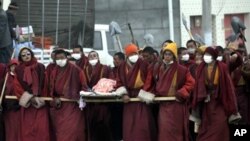Earthquake survivors say the Tibetan monks helped first, bringing food, pitching tents and digging through rubble after disaster hit far western China a week ago, killing and injuring thousands.
Now the Buddhist monks who responded first are being pushed out of the disaster area and off of state media — apparently sidelined by Beijing's unease with their heroism and influence.
Monasteries were given verbal orders this week to recall their monks. Amid hours of coverage for China's national day of mourning on Wednesday, no monks were visible in the official proceedings.
It was a jarring omission in light of their contributions to the weeklong rescue and relief effort following the quake, which killed 2,064 people and injured more than 12,000 others.
Tsebtrim, an ethnic Tibetan who works as a translator in Yushu, the county in Qinghai province hit hardest by the April 14 quake, was among thousands left homeless. He recalls heading to the horse racing grounds shortly after the earthquake with hundreds of others who heard it would be a safe place if the local dam broke.
"There were these monks from Sichuan's Ganzi who had put up all these tents, 100 tents, in just a couple of hours and they provided drinks and food," said Tsebtrim, 31, who like many Tibetans has one name. "That night, a lot of people didn't have a place to stay so I am really glad those monks showed up."
In the days that followed, Tsebtrim saw monks digging through rubble for survivors or bodies, first alone and then with Chinese soldiers. He also saw them handing out food and medicine.
"It really impressed me a lot," he said during an interview from Yushu, where he is helping run an aid station.
Chinese military officials said this week nearly all the roughly 12,000 soldiers who rushed to the quake area struggled with altitude sickness and many had trouble communicating with Tibetan survivors. Tibetan-speaking monks, many of whom live in high-altitude areas or frequently make pilgrimages to them, didn't have those problems.
They flooded into Yushu within hours, on motorbikes and packed in the back of trucks.
On Saturday, they held a cremation ceremony, preparing hundreds of bodies, praying and burning the corpses in a massive trench outside of Yushu.
Yet state-run broadcasters have given scant attention to their efforts, spotlighting instead the hard work of the military and the People's Armed Police as they delivered tents, water and food, and lifted injured people from cracks of crumbled buildings.
Monks also live in the quake zone, though they were not shown in media coverage Wednesday.
Information for this report was provided by AP.





